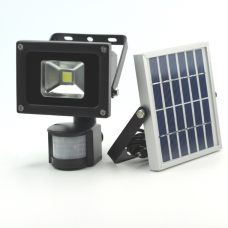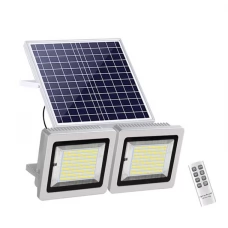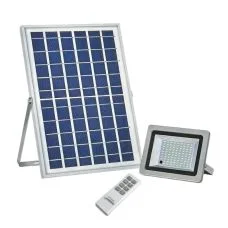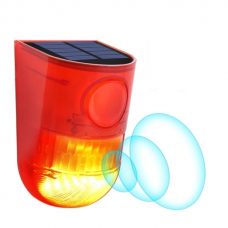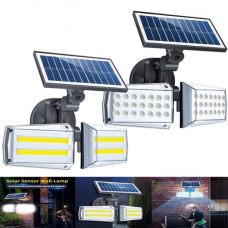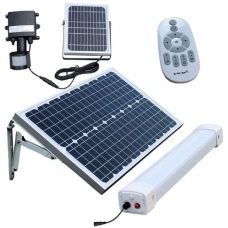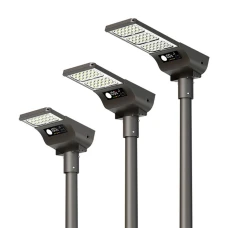Home and property security is a top priority for everyone. With a wide range of security lighting options available in the Australian market, choosing the right one can be daunting. This article will explore the two most popular options - solar and traditional security lights. We'll examine their differences, weigh their pros and cons, and help you decide which type of security lighting is right for you.
What are Solar Security Lights?
Solar-powered security lights use energy from the sun to power their batteries. During the day, they collect energy from the sun through their solar panels and then store it in their batteries for use at night. When motion is detected, the lights turn on automatically, illuminating your property. These lights are easy to install, cost-effective, and environmentally friendly.
The Benefits of Renewable Energy Security Lights
One of the main advantages of solar-operated security lights is their cost-effectiveness. Unlike traditional security lights, they do not require electricity from the grid. This means they can significantly reduce your electricity bill while providing excellent security lighting for your property.
Another benefit of eco-friendly security lights is that they are environmentally friendly. They do not emit harmful greenhouse gases, and they reduce your carbon footprint. By installing these security lights, you're making your home more secure and contributing to a cleaner environment.
Statistics and Data on the Energy Cost Savings of Solar-Powered Security Lights:
According to the Australian Clean Energy Council, installing a solar-powered light can save up to 50% on energy bills compared to traditional security lights. This is due to the fact that eco-friendly lights use energy from the sun to power their batteries, which eliminates the need for electricity from the grid.
Overall, these statistics demonstrate the clear energy cost savings and environmental benefits of using solar lights over traditional security lighting.
Factors to Consider When Choosing Security Lights Powered by the Sun
When choosing solar lights to enhance security, here are several factors to consider. Firstly, the location of your property and the amount of sunlight it receives are essential factors to consider. If trees or other buildings shade your property, you may need to opt for brighter lights or install them in a different location.
Battery life is another important factor to consider. You'll want to choose solar security lights with long battery life to provide adequate lighting throughout the night.
Finally, you'll want to choose solar security lights that are bright enough to light up your property. Look for lights with higher lumens output, as they will provide more illumination.
What are Traditional Security Lights?
On the other hand, traditional security lights use electricity from the grid to power their bulbs. They are available in a wide range of styles and sizes and are usually wired into your home's electrical system. Traditional security lights are known for their reliability and brightness, making them popular among many homeowners in Australia and around the world.
The Benefits of Traditional Lights for Security
One of the main benefits of traditional lights for security is their brightness. They are usually brighter than solar-operated LED products, which can help to deter intruders and provide better visibility for you and your family at night.
Traditional security lights are also known for their motion-detection capabilities. They can be set to turn on automatically when motion is detected, saving energy and providing an extra layer of security for your property.
Factors to Consider When Choosing Traditional Security Lights
When choosing traditional lights, there are several factors to consider. Wiring is essential; you'll need to ensure the lights are correctly wired into your home's electrical system. This may require professional installation, which can add to the overall cost of the lights.
Maintenance is another factor to consider. Traditional lighting requires regular maintenance to ensure that they continue to function correctly. This can include replacing bulbs, checking wiring, and cleaning the fixtures.
Finally, energy usage is another factor to consider. Old-fashioned security lights use electricity from the grid, which can add to your electricity bill. However, they can be more reliable than solar security lights, especially in areas with limited sunlight.
Comparison between Solar and Traditional Lighting
Now that we have looked at the benefits and factors to consider for both types of security lights let's compare them to help you decide.
Brightness and Illumination:
Traditional security lights are usually brighter than solar security lights. They provide better visibility and can help to deter intruders. However, solar security lights have come a long way in recent years and are now available with higher lumens output, which can provide sufficient brightness for most outdoor spaces.
Cost:
One of the most significant advantages of solar security lights is their cost-effectiveness. They do not require electricity from the grid, which can significantly reduce your electricity bill. Traditional security lights require electricity from the grid, which can add to your electricity bill. Additionally, solar security lights do not require professional installation, which can further reduce the overall cost.
Environmental Impact:
Solar-powered lights are environmentally friendly, as they do not emit harmful greenhouse gases and reduce your carbon footprint. Traditional security lights, on the other hand, contribute to the carbon emissions of the grid, making them less environmentally friendly.
Installation and Maintenance:
Solar security lights are easy to install and require little to no maintenance. They can be installed in minutes and do not require any wiring or professional installation. On the other hand, traditional security lights require professional installation and regular maintenance to ensure they continue to function correctly.
Longevity and Durability:
Solar security lights have a longer lifespan than traditional ones, as they do not require bulbs to be replaced or wiring to be checked. They are also more durable than conventional security lights, as they do not have any fragile components that can break or malfunction.
Maintenance Requirements for Solar and Non-Renewable Lights:
Battery-operated lights: While they require little to no maintenance, they should be periodically cleaned to remove any dirt or debris that may accumulate on the solar panels, affecting their performance. It is also essential to regularly check the battery and replace it if it starts to lose its capacity.
Conventional lights: These lights require more maintenance than solar lights. Bulbs should be replaced periodically, and the fixtures should be checked for any signs of wear or damage. The wiring should also be checked regularly to ensure it still functions properly.
Information on How to Properly Dispose of Lighting Products depending on their Power Source:
Solar-Charging Security Lights:
At the end of their useful life, solar security lights should be disposed of properly. The batteries and solar panels should be removed and recycled at a designated recycling facility. The remaining plastic and metal components can be recycled or disposed of according to local regulations.
Grip-Powered Security Lights:
When disposing of traditional security lights, it is crucial to separate the bulbs, fixtures, and wiring for proper disposal. The bulbs can be recycled at designated recycling facilities, while the fixtures and wiring can be recycled or disposed of under local regulations.
Comparison Table Summarizing the Key Differences and Features of Renewable Energy and Traditional Grip-Operated Lights:
|
Feature
|
Solar Security Lights
|
Traditional Security Lights
|
|
Power Source
|
Solar Panels
|
Electricity from the grid
|
|
Cost
|
Low initial cost, no electricity costs
|
Higher initial cost, ongoing electricity costs
|
|
Environmental Impact
|
No greenhouse gas emissions, reduce carbon footprint
|
Contributes to greenhouse gas emissions, higher carbon footprint
|
|
Installation
|
Easy, no wiring required
|
Requires professional installation and wiring
|
|
Maintenance
|
Little to no maintenance is required
|
Requires regular maintenance and bulb replacement
|
|
Brightness
|
Lower lumens output may not be as bright as traditional lights
|
Higher lumens output, brighter than solar lights
|
|
Motion Detection
|
It may not be as sensitive as conventional lights
|
Sensitive motion detection can be adjusted to different settings
|
|
Longevity
|
Longer lifespan, no bulbs to replace
|
With shorter lifespans, bulbs may need to be replaced
|
Conclusion: What Light is Better After All?
Choosing the right type of security lighting for your property can be difficult. Both solar and traditional lights have pros and cons, and the decision ultimately depends on your specific needs and circumstances.
If cost-effectiveness, environmental impact, and easy installation and maintenance are important, solar security lights may be the best option. However, if brightness, motion detection, and reliability are your main priorities, traditional security lights may be the better choice.


